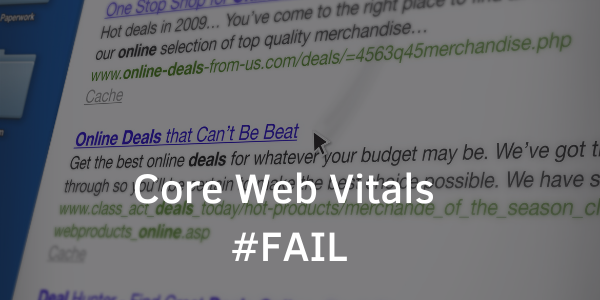 |
||||||||||
|
||||||||||
| Core Web Vitals Gets Pushed Back (and Most Sites Don’t Rank Well Yet Anyway) |
 |
| If Google’s new Core Web Vitals benchmarks for the “page experience” became the standard for how sites get ranked in search today — most sites wouldn’t rank highly at all. At least that’s according to analysis from SearchMetrics (reg wall), which parsed over 2 million webpages and found that only 4% of them got “good” scores across all three of the Core Web Vitals. (Interestingly enough, Google’s own YouTube didn’t score well at all). So it’s good news perhaps, that the Core Web Vitals metrics won’t be fully factored into a site’s search ranking until the end of August. Previously, webmasters were preparing to deal with the new standards as of May, but Google announced that it would be “slowly adding” Core Web Vitals to the mix of signals it uses to rank sites starting in mid-June. Breathe easy, SEO pros. |
| Search rankings are not the “be-all end-all” for publishers (and that’s especially true for media companies with rabid audiences that already know and love their brands). But in a world where people discover new publications through search snippets, making sure that you rank well for the topics that matter can help drive audience growth. It can also impact campaign performance, which ultimately impacts ad revenue. Mediapost’s Laurie Sullivan does a nice, quick dive into some of the most common factors that can drag down a Core Web Vitals score. And while it’s no surprise that slow-loading ads and content blocks that shift around too much can make a ranking suffer, the observation that sites could be penalized because they’re built on WordPress or Wix templates that contain “unnecessary code,” was interesting to note. So having more time to tend to the three Core Web Vitals metrics — loading time, interactivity, and visual stability — is a good thing. And it’s just one more reminder that keeping the user experience front-and-center — whether in terms of how fast your content loads, the ads that populate (or don’t), and of course, figuring out an easy way to get the “opt-in” for data collection — is just common sense. |
| Google: We're Replacing Cookies With FLoC Everybody Else: Not On My Block |
 |
| While FLoC testing has commenced on Chrome, other browsers—Edge, Safari, and Firefox—are pushing back on Google's cookie replacement. The triad of browsers joins the Brave Browser, which knocked the Big G's cookie alternative for not really being a privacy solution last week. Vivaldi also won't be participating in the FLoC trials, and DuckDuck Go has released an extension to block FLoC. Mozilla and Firefox aren't buying that non-consented user data is the best path forward for a privacy-safe advertising future. Who's to say that these guys won't join the Alpha browser at a later date, but as of now, Chrome is flying solo. Lonely bird. And while rumors circulated that WordPress will treat FLoC as a security risk and block it, the software company's founder Matt Mullenweg announced that there are currently only discussions amongst the WP community about blocking FLoC and no final decision has yet been made. WordPress developers are already publishing plugins that can be used to block FLoC on sites made using WP. |
| We're not surprised at all by this rough start for FLoC testing. As the current proposal for FLoC stands, it continues in the tradition of bad tracking moves, since it requires collecting data about web users without their consent or understanding. Back in July, there was dissension within the W3C related to Chrome vehemently pushing FLoC forward without the full support of the membership. Also, questions remain about whether users will be given transparency into which cohorts they are segmented into or if they will have control over their data, with the ability to delete information or remove themselves from cohorts as recent privacy legislation like GDPR and CCPA allow. Other critics still believe that FLoC will give unfair advantages to Google, which would help the tech giant maintain its dominant share of advertising dollars. |
| Around the Water Cooler |
| Here's what else we're reading and talking about... Are You Ready For ATT? TIME Accepts Cryptocurrency Ad Spend Coming Back Strong Ad Tech CTV Alliance Cookie Death Will Compound Ad Tech Issues Contextual Raises Another Round Penske Media Group Buys SXSW |
| @{optoutfooterhtml}@ |










